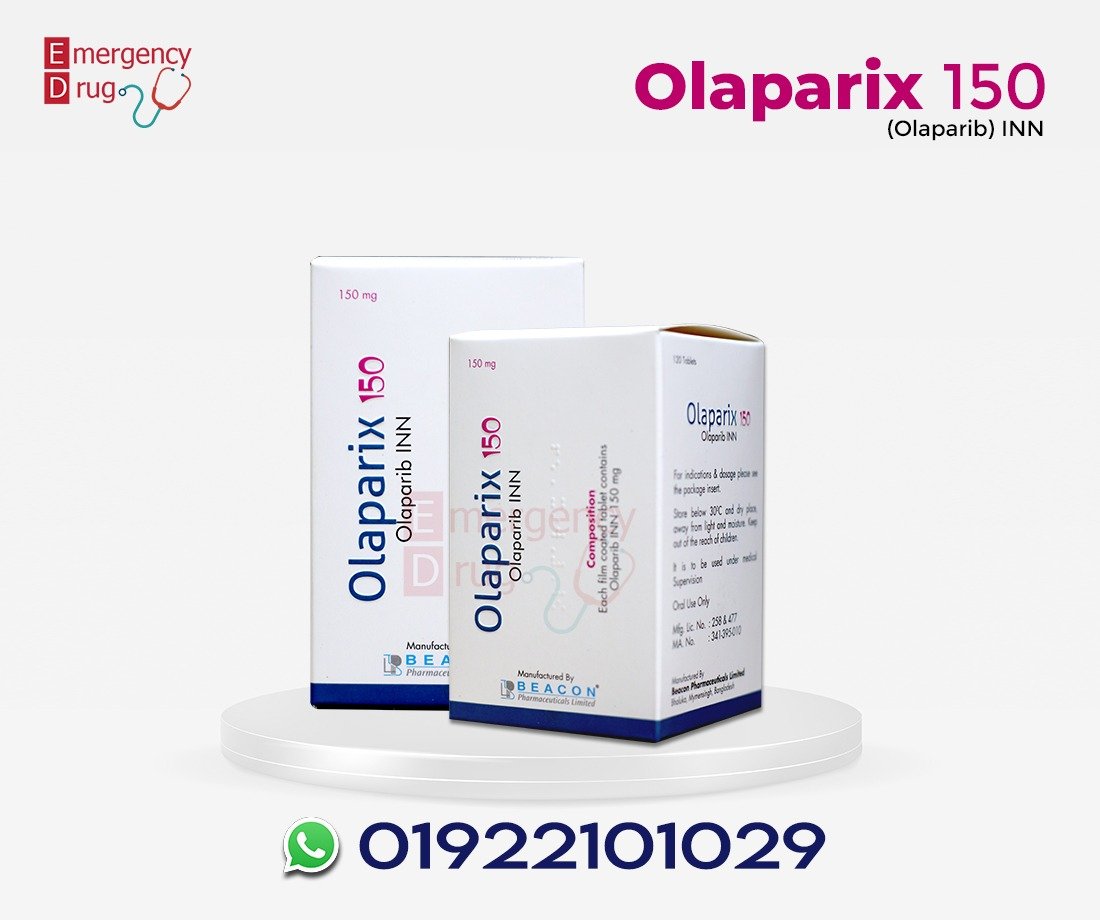









Olanib (Olaparib) 150 MG – 120 Tablets
Price: $410.00
Olaparib Medicine use to maintain the response of various types of ovarian (female reproductive organs where eggs are formed), fallopian tube (tube that transports eggs release with the ovaries to the uterus), and peritoneal (layer of tissue that lines the abdomen) cancer in people who complete response or partially responses to their first or later chemotherapy treatments. Olanib tablets also use to treat various types of breast cancer that has spread to other parts of the body and has not improved or has worsened after treatment with other therapies. Olanib Capsules also use to treat a certain type of prostate cancer that has spread to other parts of the body, no longer responds to medical or surgical treatments to lower testosterone levels, and has progressed after treatment with enzalutamide (Xtandi) or abiraterone (Yonsa, Zytiga). Olanib capsules are also use to treat ovarian cancer that has not improved or has worsened after treatment with at least three other therapies. Olanib maintains the response of a certain type of pancreatic cancer that has not spread or progressed after the first chemotherapy treatment.


Description
Olaparib is an inhibitor of poly (ADP-ribose) polymerase (PARP) enzymes, including PARP1, PARP2, and PARP3. PARP enzymes are involved in normal cellular homeostasis, such as DNA transcription, cell cycle regulation, and DNA repair. Olaparib has been shown to inhibit growth of select tumor cell lines in vitro and decrease tumor growth in mouse xenograft models of human cancer both as monotherapy or following platinum-based chemotherapy. Increased cytotoxicity and anti-tumor activity following treatment with olaparib were noted in cell lines and mouse tumor models with deficiencies in BRCA. In vitro studies have shown that olaparib-induced cytotoxicity may involve inhibition of PARP enzymatic activity and increased formation of PARP-DNA complex, resulting in disruption of cellular homeostasis and cell death.
Indication
Breast Cancer: Olaparib is indicated as monotherapy for the treatment of adult patients with deleterious or suspected deleterious germline BRCA-mutated (gBRCAm), human epidermal growth factor receptor 2 (HER2)-negative metastatic breast cancer who have previously been treated with chemotherapy in the neoadjuvant, adjuvant or metastatic setting. Patients with hormone receptor (HR)-positive breast cancer should have progressed on or be considered inappropriate for endocrine therapy. Germline BRCA mutation must be confirmed before Olaparib treatment is initiated.
Ovarian Cancer: Olaparib is indicated as monotherapy for the maintenance treatment of adult patients with platinum sensitive relapsed (PSR) high-grade epithelial ovarian, fallopian tube or primary peritoneal cancer who are in response (complete response or partial response) to platinumbased chemotherapy.
Brand Name: Olanib
Generic Name: Olaparib
Packing: 112
Form: Capsule
Strength: 50mg & 150mg
Manufacturer: Everest Pharmaceuticals Ltd.
Country: Bangladesh
Side Effects
The most common serious adverse reaction reported was anemia (2.4% olaparib vs 2.2% chemotherapy). The following serious ADRs were reported in one patient each: dermatitis allergic, neutrophil count decreased and platelet count decreased. The proportion of patients who permanently discontinued Olaparib due to adverse events was 4.9% in the Olaparib arm compared with 7.7% in the chemotherapy arm. Anemia and platelet count decrease were the only adverse reactions leading to discontinuation of Olaparib in more than one patient.
Pregnancy & Lactation
Pregnancy: Olaparib can cause fetal harm when administered to a pregnant woman based on its mechanism of action and findings in animals. It is wasteratogenic and caused embryo-fetal toxicity in rats at exposures below those in patients receiving the recommended human dose of 400 mg twice daily. If this drug is used during pregnancy, or if a patient becomes pregnant while taking this drug, apprise the patient of the potential hazard to the fetus and the potential risk for loss of the pregnancy.
Nursing Mothers: It is not known whether this is excreted in human milk. Because many drugs are excreted in human milk and because of the potential for serious adverse reactions in nursing infants from olaparib, a decision should be made whether to discontinue nursing or to discontinue the drug, taking into account the importance of the drug to the mother.
Overdose Effects
There is no specific treatment in the event of overdose, and symptoms of overdose are not established. In the event of an overdose, physicians should follow general supportive measures and should treat symptomatically.
For more Oncology medicine, visit our SHOP













Reviews
There are no reviews yet.